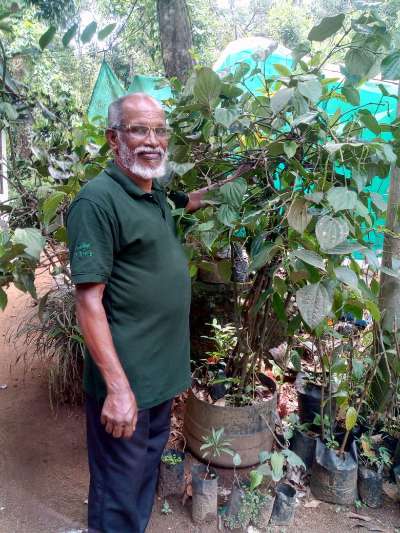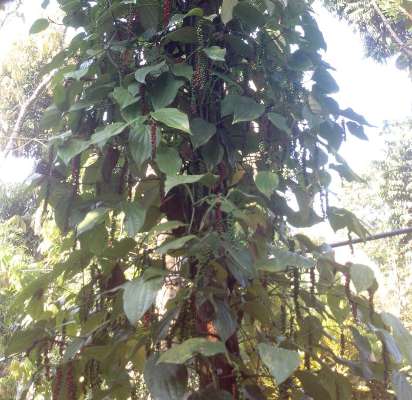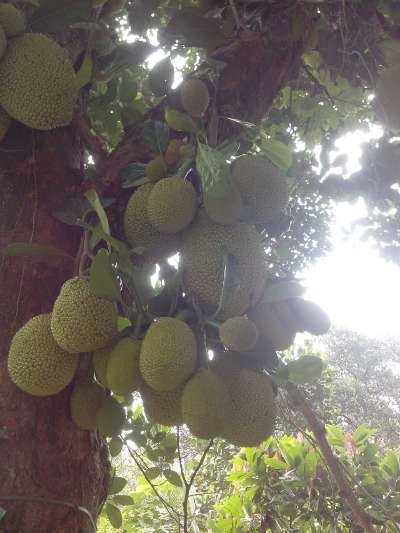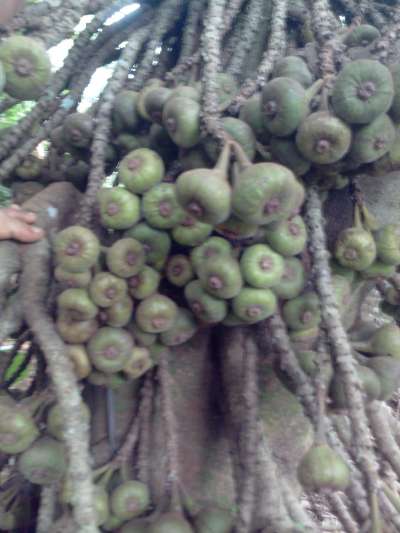
At 2,230 feet above sea level, there is little chance that you will come across an organic farm, let alone a thriving food forest.
Which is why the 5-acre patch of self-sustaining farmland, inside the densely forested village of Patteyakudi in the Idukki district of Kerala, comes as such a surprise.
Here, you will find all sorts of vegetables, native and wild fruits found only in the Western Ghats, medicinal plants and many varieties of spices, being grown without any difficulty.
And this is all thanks to one man’s enduring passion for organic farming and commitment to environmentally sustainable practices.
For the past forty years, PG George has been practising ‘Jaiva Idavila Samrakshana Krishi,’ a term that he coined, which can be best explained as an intermingling of organic farming with multi- cultivation as well as integrated farming practices.
For George, farming was never just a pursuit to feed his family or rake in profits, but more like a legacy handed down generation after generation in his community.
But none of these aspects or facets come close to showcasing the genius of the 67-year-old.
George’s lone efforts have led to the development of several black pepper varieties, one of which has even received accreditation from the National Innovation Foundation (NIF) as well as Kerala Agricultural University (KAU).
Before we shed light on George’s success with black gold, there is a compelling tale involving struggle, hard work and undying optimism that has led the man to where he has today.
Let’s begin with that.
In conversation with The Better India, George shares how farming has been deeply embedded with the way of life for him and his people.
“I hail from a tribal community from Nedumavu near Pala. Our lives have traditionally revolved around farming and livestock rearing,” he says.
George had quit school at the age of 16, which meant that he did not have too many options, other than farming, to fend for himself.
However, as he was one among the eight children of a financially-strapped family meant that there wasn’t enough land for farming that could be distributed between all.
This would prove to be a major roadblock for George.
“My community was socially ostracised-we did not have the backing of any political party, and did not receive any support from the state. I was desperate to find some land and joined a movement where we tried to usurp several acres of land possessed by private tea estate holders from the British era, but ended up getting arrested. Although the state eventually ended up distributing land to many people, discriminated communities like ours were still ignored and given nothing,” recalls George.
Things would finally look up for George after he got married and moved to Patteyakudi, an Adivasi colony, where he would find people incredibly welcoming and open to selling their land.
There was, however, one major drawback-the land wasn’t cultivable.
“It is common knowledge that tea and rubber are grown in extremely high altitudes, and paddy and other crops thrive in flatlands. This land was in-between these two terrains. The same is true for its climate-it was neither too hot nor too cold here. Rubber, coconut and cashew nuts are amongst the crops that are widely grown across the state, but this land wasn’t fertile to even yield those. But I was relentless, and after much experimentation and research, I understood that the only crop that could be grown here, albeit sparingly, was black pepper,” says George.
He shares that while the initial few harvests were successful owing to the relatively unaffected topsoil, the subsequent ones were utter failures.
“During the time, severe thunderstorms and rains ended up wiping out almost all varieties of pepper crops across Idukki and Wayanad districts. Even in my farm, most varieties didn’t survive except for two native types, namely, thotta mundi and neeli mundi,” George explains.
It was from these two species that he would develop the Zion Mundi variety in the early 1990s, which upon being grafted to the Brazilian Thippali plant, would reap George, not just great harvests, but also national acclaim.

What made this variety a success was its high yielding capacity, high resistance to diseases, comparatively bigger berries and long and uniform sized spikes (15-20 cm).
In fact, Zion Mundi can easily give a yield of 7 kg (dry) from a single vine and 7,700 kg from a hectare.
Soon, this high-yielding black pepper variety began to gather awards and accolades, starting with the Krishi Vigyan Kendra in Kannur honouring him as the second best ‘farmer-scientist’ in the state.
Following this, he went on to develop four more varieties from heritage types of black pepper.
In addition to the development of new varieties, George had another mission-to conserve many heritage varieties of black pepper that were slowly fading away into obscurity.
He attributes this knowledge to his ancestral legacy of his community, who were experts with plants and herbs grown in the wild.
“It was through the efforts of conserving and growing these that later helped me develop better varieties through their strains,” he adds.
George’s extraordinary contributions didn’t go unnoticed. In 2015, during NIF’s 8th National Biennial Competition, he was presented with a National Award by the President of India for Zion Mundi. This variety is registered with Limca book of records for its better performance and certified by Lacon for its suitability in organic cultivation.
While black pepper might have made George a star in the Indian agrarian scene, his farmland isn’t just limited to the spice.
“In adherence to practising ‘Jaiva Idavila Samrakshana Krishi,’ I have cultivated hundreds of jackfruit trees here, that are used as a support for the black pepper vines. All these years, I have strictly followed farming practices that are beneficial in conserving the biodiversity of the region. The benefits are aplenty-you can preserve the soil as well as recharge the groundwater table,” he explains.
He adds that the reason why he chose jackfruit trees instead of commercial ones like teak or silver oak is that these are best for soil conservation while giving so many fruits.


“In addition to that, I’ve also utilised medicinal trees like Ashokam and Kumbil to support the vines. Unlike most farmers in Kerala these days, my methods have steered clear of pesticides and chemicals, as I believe that when we protect the environment and the soil through organic farming practices, we strengthen their ability withstand devastating calamities like last year’s floods,” he adds.
He also mentions that although such a path can often be testing and long drawn, the end resulting can go on to earn you rich benefits and also a self-sustaining food forest system that can yield for years.
In his farm, George also rears livestock like goats, cows, rabbits, pigs and poultry including hens, ducks and other native birds; their excreta along with vegetable waste fulfils the compost and manure requirement of the entire farm.
There are also five ponds spread across the farm, where he raises a variety of local as well as ornamental fish. “The only thing that we still purchase from the market is paddy, as we can’t grow it here. Everything else is freshly harvested from our farm,” he says.
One can also find many wild fruits being nurtured across George’s farm that most urban folks wouldn’t have come across ever.
“Many of these are extremely medicinal and extremely good for health,” he says.
George mentions that his family, comprising his wife, Rachel, and five children, have been a part of this venture right from the start and have played as crucial a role in making the food forest what it is today.
As of the annual yield, George shares that they’re able to harvest close to five to six quintals of pepper.
Since the market for organic pepper is still quite nascent in Kerala, he adds that they don’t rake in bumper returns through sales at open markets but earn enough to feed his family and take good care of his farm and its beings.
On a parting note, we ask George if he has any message for the coming generation in regards to organic farming.
“Definitely. So many students from schools, colleges and agricultural universities visit us to learn environmentally sustainable farming methods. I believe that if the youth is given ample exposure to farming, right from their school days, it can play a significant role towards environment conservation. Besides, it is also good for the economy,” he concludes.
George’s farm is open to anyone who loves organic farming or would like to learn from him. You can call him at 8111915160.
Article Credit: Daily Hunt
